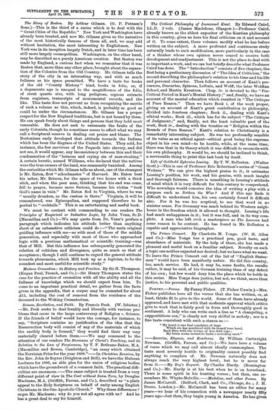The Story of Boston. By Arthur Gilman. (G. P. Putnara's
Sons.)—This is the third of a series which is to deal with the "Great Cities of the Republic." New York and Washington have already been treated, and now Mr. Gilman gives us the narrative of the most historically famous of them all, and, we may add without hesitation, the most interesting to Englishmen. New York was in its inception largely Dutch, and in later time has been still more largely cosmopolitan. Washington, on the other hand, may be described as a purely American creation. But Boston was made by England, a curious fact when we remember that it was Boston that, more than any other place, brought about the separa- tion of the Colonies from the Old Country. Mr. Gilman tells the story of the city in an interesting way, and with as much fullness as his space permitted. We have a taste for books of the old "County History" kind, books in folio, or, if a degenerate age is unequal to the magnificence of the folio, of stout quarto size, with long pedigrees, copious extracts from registers, transcripts of monumental records, and the like. This taste does not prevent us from recognising the merits of such a volume as this, which, indeed, is probably as good as could be under the circumstances. Mr. Gilman has a proper respect for the New England traditions, but is not bound by them. He can speak freely about things and persons that they hold most venerable. He does not seek to extenuate the faults of the early Colonists, though he sometimes seems to affect what we may call a Scriptural reserve in dealing out praise and blame. The Bostonians early developed that attitude towards the Indians which has been the disgrace of the United States. They sold, for instance, the few survivors of the Pequods into slavery, and did not see, it would appear, any inconsistency between this and their condemnation of the "heinous and crying sin of man-stealing." A certain heretic, named Williams, who declared that the natives were the true owners of the land, was summarily banished. Among the curiosities which Mr. Gilman tells us about, one of the strangest is Mr. Eaton, first " schoolmaster " of Harvard. Mr. Eaton beat his usher, Mr. Briscoe, for the space of two hours with a thick stick, and when the poor man, thinking that his end was come, fell to prayer, became more furious, because his victim "took God's name in vain." Mr. Eaton fled to Virginia, where he was "usually drunken, as the custom is there." Virginia, it will be remembered, was Episcopalian, and supposed therefore to be partial to "cocktails." This is an entertaining and useful book.
We must be content with commending to our readers The Principles of Empirical or Inductive Logic, by John Venn, Sc.D. (Macmillan and Co.)—We may quote from Dr. Venn's preface a paragraph which indicates his attitude better than anything short of an exhaustive criticism could do :—" The main original guiding influence with me—as with most of those of the middle generation, and especially with most of those who approached logic with a previous mathematical or scientific training—was that of Mill. But this influence has subsequently generated the relation of criticism and divergence, quite as much as that of acceptance; though I still continue to regard the general attitude towards phenomena, which Mill took up as a logician, to be the soundest and most useful for scientific study."


















































 Previous page
Previous page